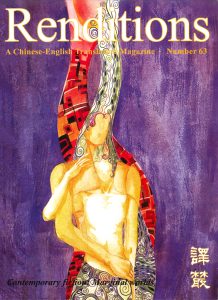Home / Renditions / Publications / Renditions Journal / No. 63
Renditions no. 63 (Spring 2005)

Contemporary Fiction: Marginal Worlds
Featuring short stories by writers from mainland China, Taiwan and Hong Kong, this issue takes a look at life lived on the margin and at the edge.
133 pages
Table of Contents
| Editor’s Page | 5 | |
| Chu T’ien-hsin | Waves Scour the Sands
Translated by Fran Martin |
7 |
| Ouyang Zi | Near Dusk
Translated by Audrey Heijns with David Lunde |
33 |
| Chi Ta-wei | Umbilicus
Translated by Susan Wilf |
47 |
| Ngan Shun Kau | The Censure of Heaven
Translated by Shin Yong Robson |
61 |
| Wong Pok | Topic of Conversation
Translated by Maggie Leung and Janice Wickeri |
73 |
| Lüqishi | Air Granny
Translated by Chi-yin Ip with Janice Wickeri |
83 |
| Shi-Kuo Chang | Nocturne
Translated by John Balcom |
96 |
| Ma Yuan | Three Ways to Fold a Paper Hawk
Translated by Herbert J. Batt |
109 |
| Book Review | 128 | |
| Notes on Authors | 130 | |
| Notes on Contributors | 132 | |
Sample Reading
The material displayed on this page is for researchers’ personal use only. If you wish to reprint it, please contact us.
Nocturne
By Shi-Kuo Chang
Translated by John Balcom
…
Peihua stared at the meter in the front of the cab; the red numbers had stopped at twenty-eight. Twenty-eight years old and still so stuck up! She could imagine what that baby-faced Dr Wu would say behind her back. Actually he wasn’t that bad, just a bit of a sissy. He was probably in his early thirties. He had come back to teach for a year in order to find a wife, no doubt. Perhaps he would still call her. But it was too much like a business transaction. The very thought of selling herself made her shudder.
The red numbers had flipped to thirty-one. So quickly! Peihua noticed the music playing in the cab-Haydn’s symphony in D major-it was a piece she liked. It was rare that a cab driver enjoyed listening to classical music. Then she suddenly recalled that the driver had asked her if she still wanted to go to Chungshan North Road. How did he know she would change her mind about going to the office? He was strange and Peihua suddenly became nervous. Having heard so many bad stories about cab drivers, she regretted not letting Dr Wu see her home. At that moment the cab driver spoke:
‘Don’t worry, I’m not a bad person.’
Peihua blushed in the darkness of the back seat. How did he know what she was thinking? From where she sat, she couldn’t see his face. He was broad shouldered and much too well built to be a cab driver. Then he spoke again:
‘Do you like Haydn?’
‘How did you know that I like Haydn?’
‘I didn’t know that,’ he guffawed. ‘I just asked whether you do or not. But you’ve already answered my question.’
‘I also like the blues and soft rock.’
‘Songs with lyrics easily affect the emotions. If you are emotional by nature and you really listen to the words of every song, you’ll be exhausted after ten songs. Classical music is better.’
Peihua didn’t know how best to respond. As the cab passed through a brighter, busier part of town, Peihua noticed a piece of paper that had been pasted up on the dashboard to the right of the driver:
A bit of time, a bit of gold
A bit of time for a bit of gold
Time bought and sold those interested please call
280-0142
Peihua had seen ads in taxicabs before, such as “Pure-bred dogs for sale’, but this was the first time she had ever seen an ad for time. ‘Time bought and sold…’ she murmured. Suddenly the cab driver turned around. ‘That’s right: time bought and sold. Are you interested, Miss?’
…
